Jiwon Choi (b.1996) is an emerging artist
gaining recognition for her paintings that capture contemporary emotions
through the imagery of antique porcelain dolls. She borrows the forms of old,
worn artificial and natural objects collected from everyday life to explore
beings that, despite having fulfilled their time, continue to exist and
influence the present.
These beings are depicted on canvas as the
result of a symbolic act—an attempt to understand both the meaning of life in
the contemporary era and the world the artist herself inhabits.
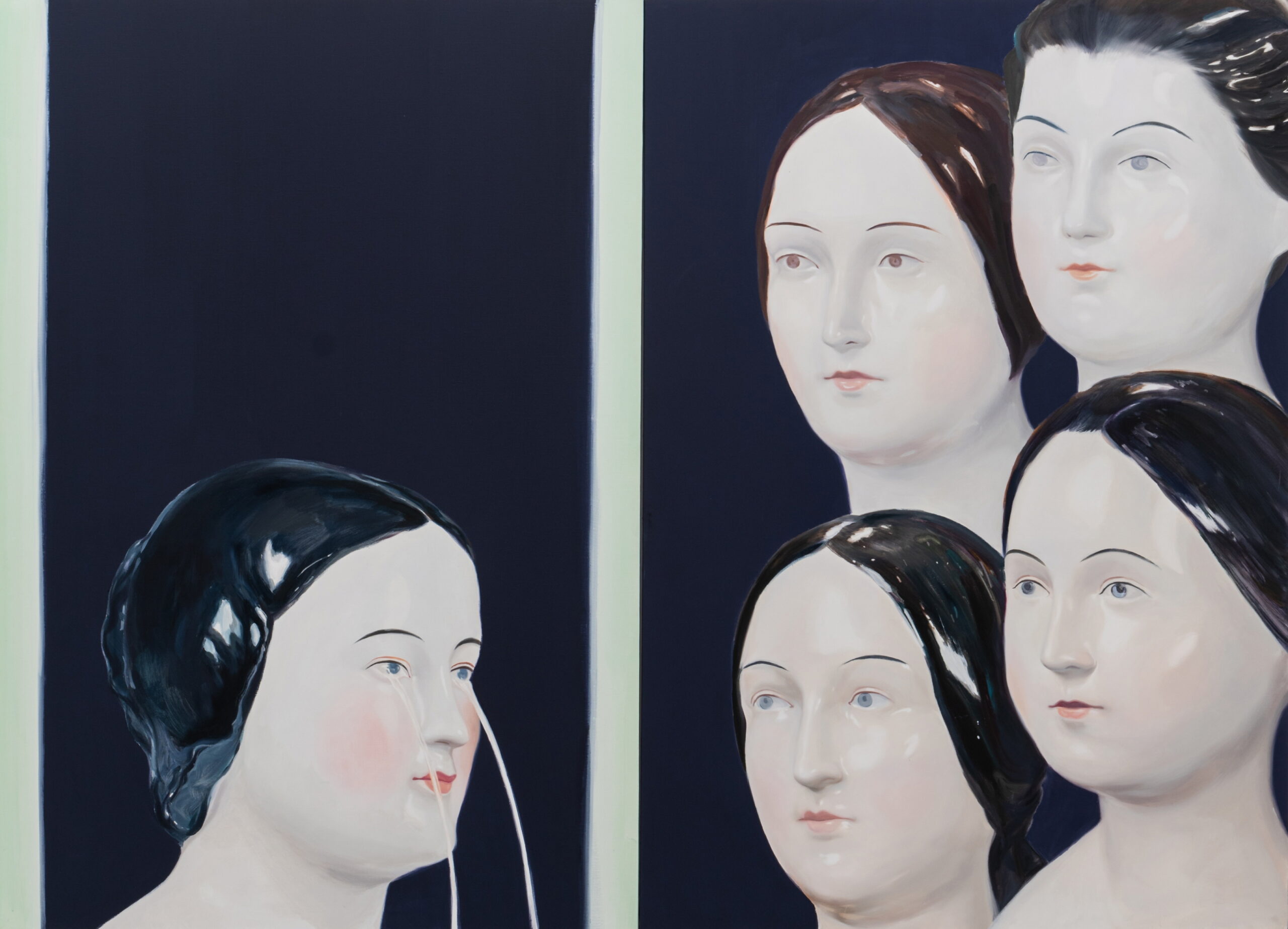 Jiwon Choi, Figures
sitting on the fence, 2019, Oil and acrylic on canvas, 162.2x224.2cm ©ThisWeekendRoom
Jiwon Choi, Figures
sitting on the fence, 2019, Oil and acrylic on canvas, 162.2x224.2cm ©ThisWeekendRoomJiwon Choi has consistently depicted
"lifeless objects" throughout her artistic practice. Using replicas
of human and animal figures as her subjects, she channels personal sensations
and experiences through these inanimate beings. Her signature porcelain doll
paintings, which brought her recognition in the art world, first emerged in
2019.
The porcelain dolls she draws inspiration
from were originally produced by European companies in the late 19th century
after adopting Chinese ceramic techniques from the 17th century. However,
rather than focusing on the historical background of these dolls, the artist is
more interested in their texture, tactility, and materiality.
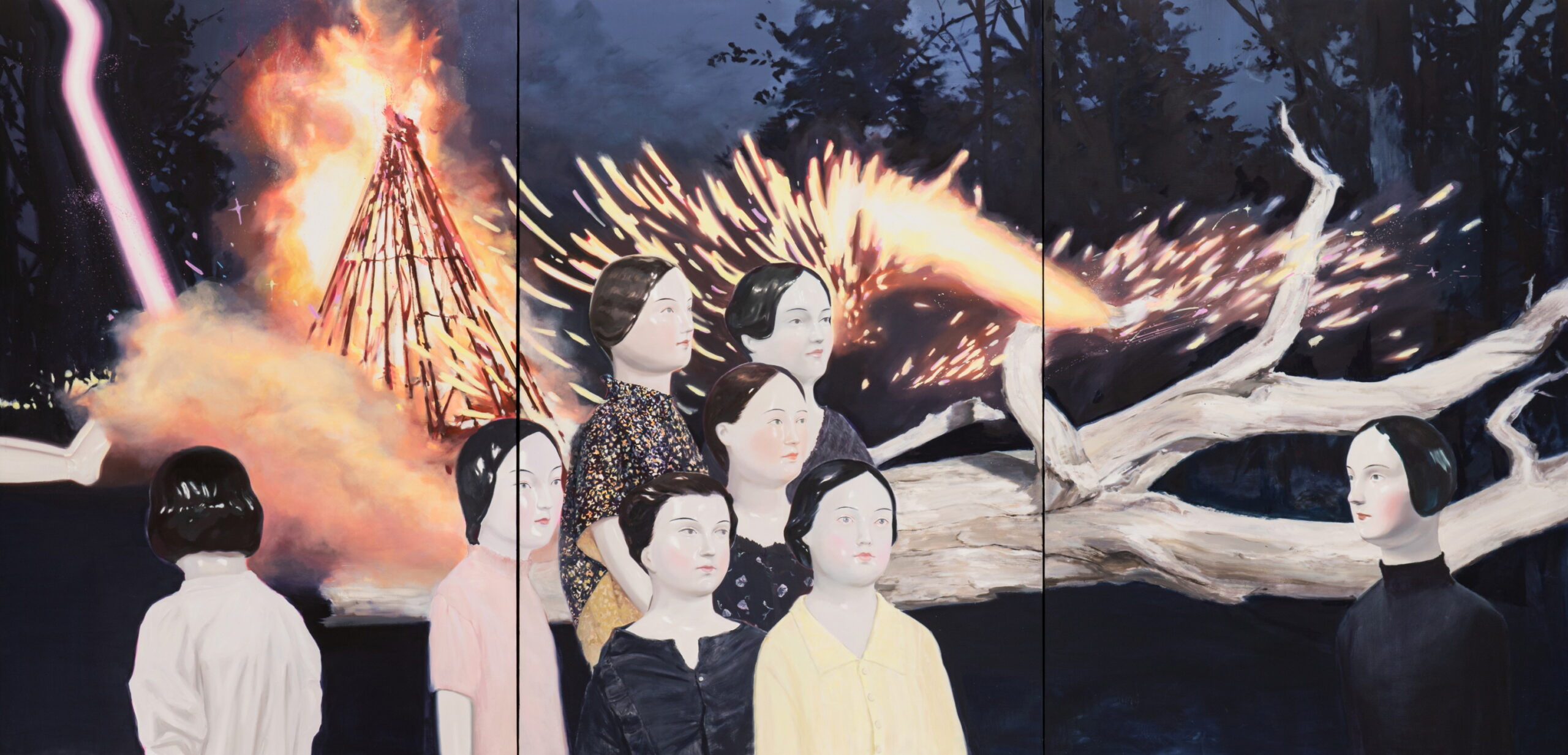 Jiwon Choi,
Where are we heading to, 2020, Oil and acrylic on canvas,
193.9x390.9cm ©ThisWeekendRoom
Jiwon Choi,
Where are we heading to, 2020, Oil and acrylic on canvas,
193.9x390.9cm ©ThisWeekendRoomJiwon Choi draws a parallel between
contemporary emotions and the dual nature of porcelain dolls—objects with a
dazzlingly smooth surface and a solid exterior, yet fragile and hollow inside,
prone to shattering in an instant if handled carelessly. Through this, she
reflects on the state of modern individuals, who appear flawless on the outside
but live in a constant state of anxiety and tension, as well as the fleeting
nature of emotions that are easily consumed and swiftly discarded.
Building on this idea, Choi began
incorporating the sleek, glossy visual qualities of porcelain figurines into
her depictions of human figures. The smooth-skinned subjects in her paintings
remain expressionless and unreactive—unfazed by fireworks exploding around them
or walking boldly through eerie forest paths, embodying an eerie sense of
emotional detachment.
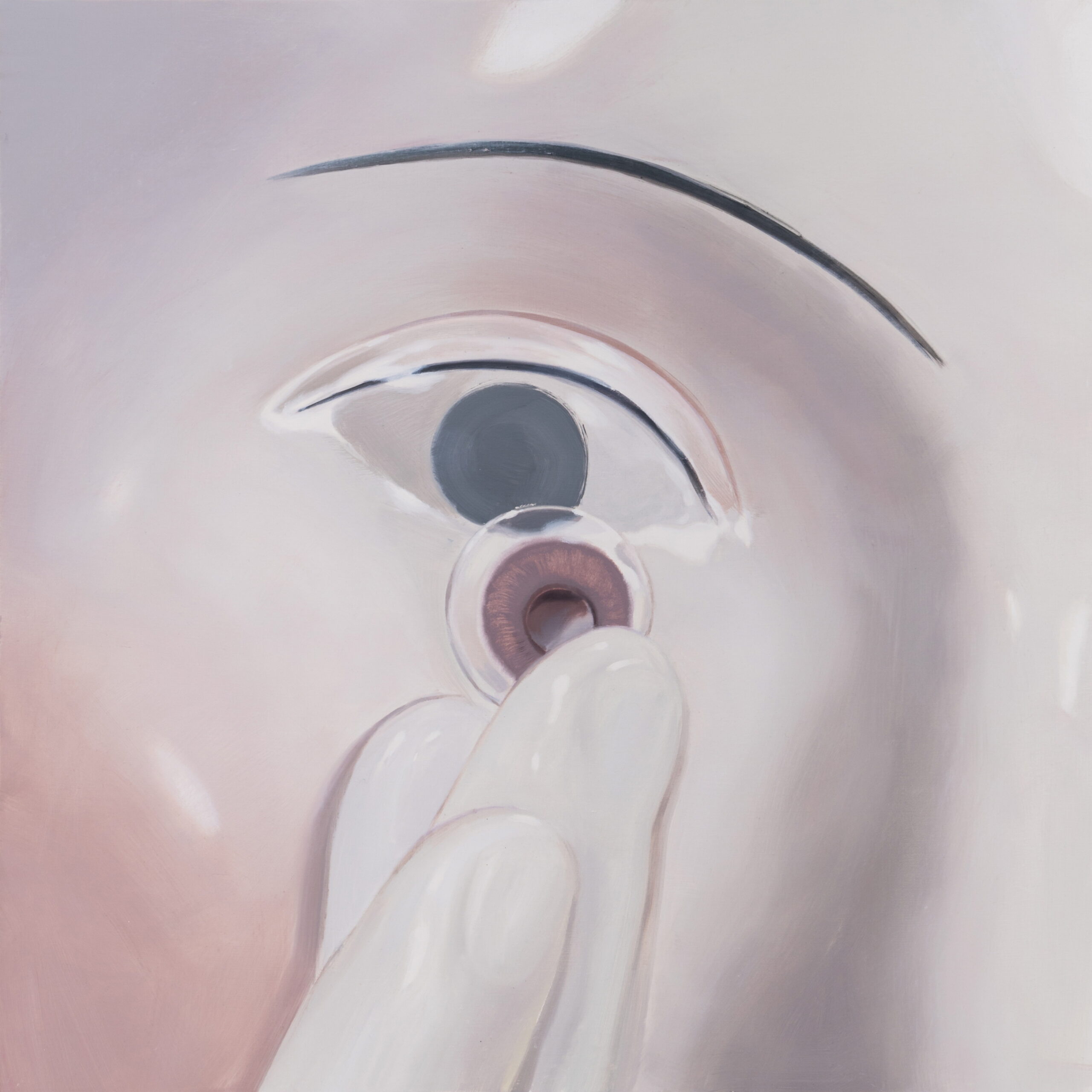 Jiwon Choi,
Untitled, 2019, Oil on canvas, 116.8x116.8cm ©ThisWeekendRoom
Jiwon Choi,
Untitled, 2019, Oil on canvas, 116.8x116.8cm ©ThisWeekendRoomAdditionally, Choi often magnifies the porcelain doll’s face to fill the entire canvas or focuses on its static upper body. This compositional choice naturally draws the viewer’s attention to the doll’s cold, expressionless face and vacant gaze. Through these depictions, Choi aims to convey the unease and emotional numbness experienced by people in contemporary society.
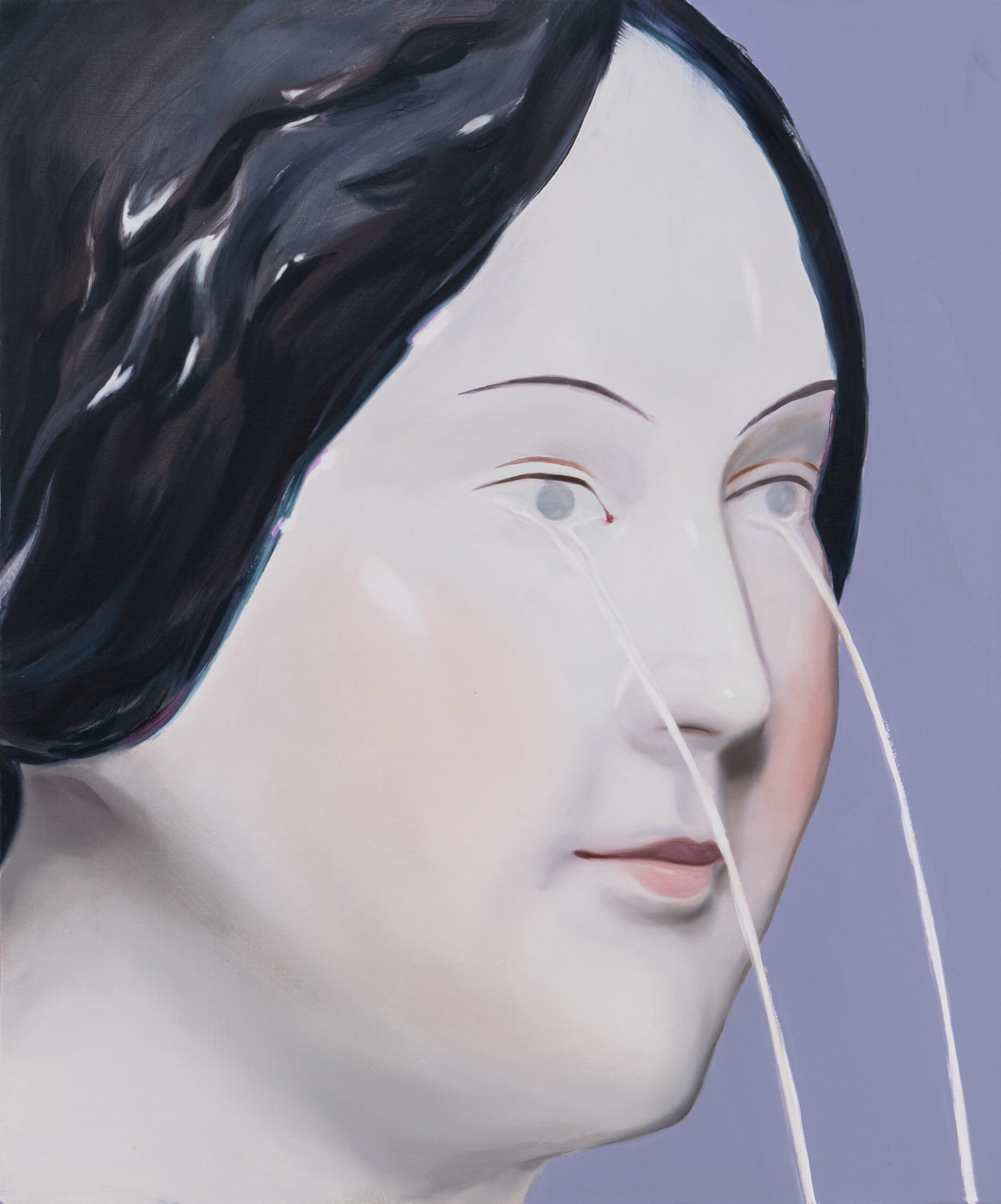 Jiwon Choi,
The Crying Woman, 2019, Oil, acrylic on canvas, 72.7x60.6cm ©ThisWeekendRoom
Jiwon Choi,
The Crying Woman, 2019, Oil, acrylic on canvas, 72.7x60.6cm ©ThisWeekendRoomThese smooth, glossy porcelain figures
faithfully convey the emotions of the present era in Choi’s work. The sense of
anxiety shared by the artist and today’s younger generation is best described
as a state of "hopelessness" and "lethargy." The looming
uncertainty of the future has intensified a crisis that now lingers in the
collective unconscious as a pervasive sense of unease.
Furthermore, Choi expresses this
contemporary emotional state not only through the porcelain dolls’ surfaces but
also by incorporating various elements. Sharp thorns, flames, lenses, and tears
appear alongside the figures, visually manifesting anxious emotions in
different contexts.
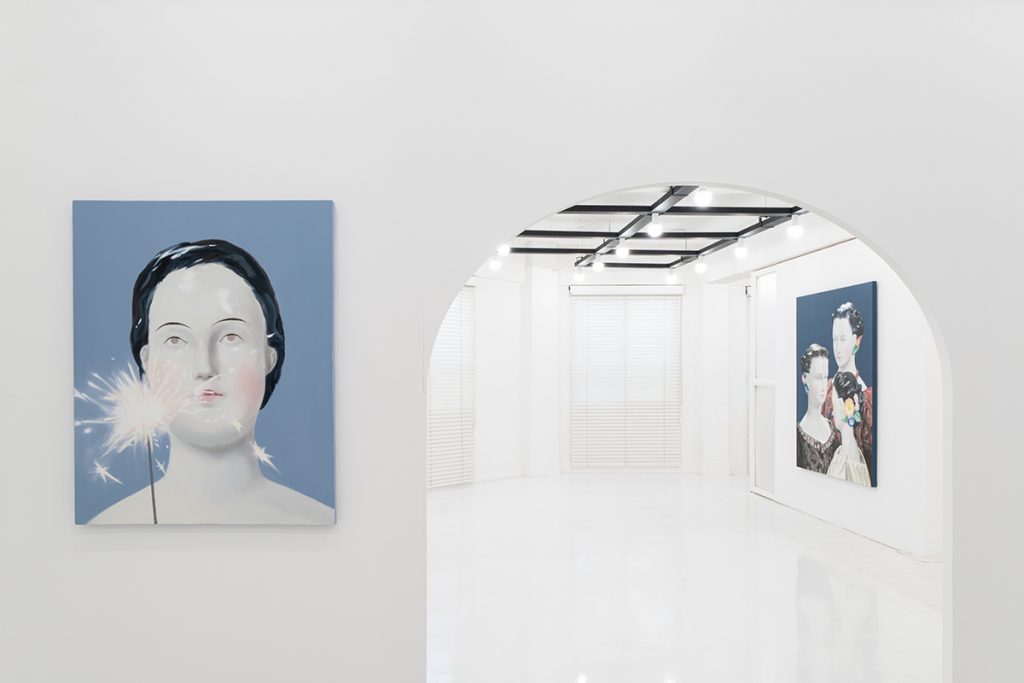 Installation view
of 《Cold Flame》 (ThisWeekendRoom, 2020) ©ThisWeekendRoom
Installation view
of 《Cold Flame》 (ThisWeekendRoom, 2020) ©ThisWeekendRoomThe portrayal of lifeless dolls shedding tears or wearing contact lenses evokes an uncanny sensation. Through these elements, the artist seeks to awaken the nonexistent senses of the inanimate figures. By forcing them to weep or fitting lenses onto sightless eyes, Choi renders them eerily lifelike, blurring the boundary between the inanimate and the living.
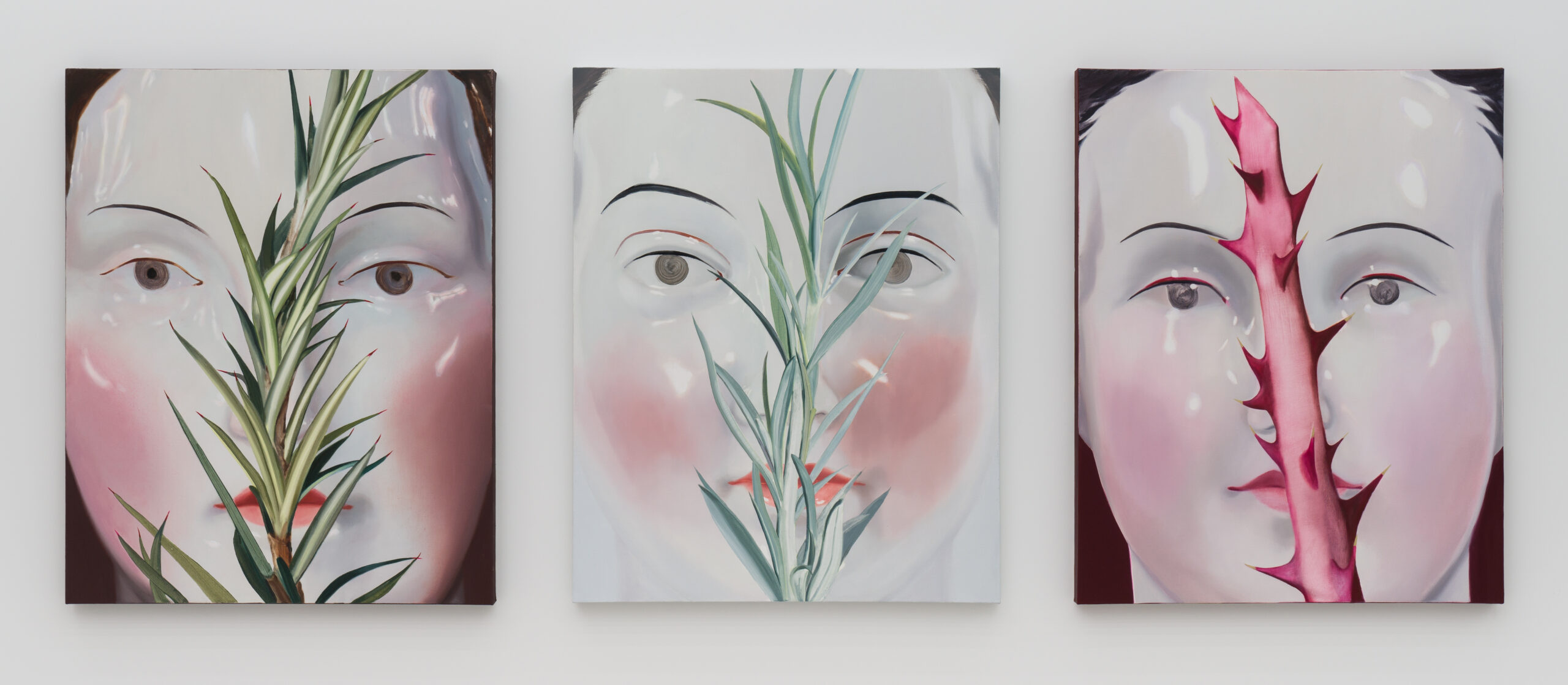 Jiwon
Choi, Fog of Thorns 2/3/4, 2021, Oil on canvas, 90.9x72.7cm
(each)
Jiwon
Choi, Fog of Thorns 2/3/4, 2021, Oil on canvas, 90.9x72.7cm
(each) In Choi Jiwon's paintings, the
juxtaposition of contrasting and foreign elements activates sensory experiences
beyond the visual by creating a clash of textures. For instance, in the ‘Fog of
Thorns’ (2021) series, sharp thorns are placed in front of smooth porcelain
faces, heightening the contrast in texture and intensifying the viewer's
sensory perception—both visual and tactile.
The tactile quality conveyed through sight
in her works provokes an urge to touch, subtly engaging the viewer’s underlying
desires.
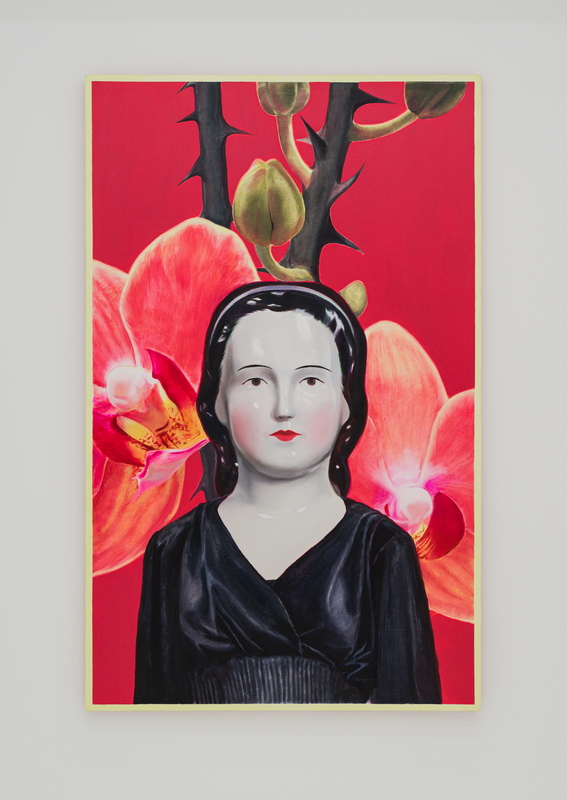
Jiwon Choi, Thorn Flowers and a Woman, 2021, Oil on canvas, 116.8x72.7cm ©ThisWeekendRoom
The artist also projects light from varying
angles onto each element within the composition, deliberately creating a clash
of disparate sensations within a single canvas. For example, in Thorn
Flowers and a Woman (2021), the artist meticulously captures the
subtle reflections and delicate shimmer on the porcelain-like skin of the
figure. In contrast, the ornate flowers and thorns in the background appear
flattened, making it difficult to discern a clear light source.
This visual contrast evokes a sense of
fragility and tension, reminiscent of a life on the verge of breaking. Standing
before the painting, the viewer experiences an acute awareness of the present
moment—almost as if holding a piece of glass in their hands.
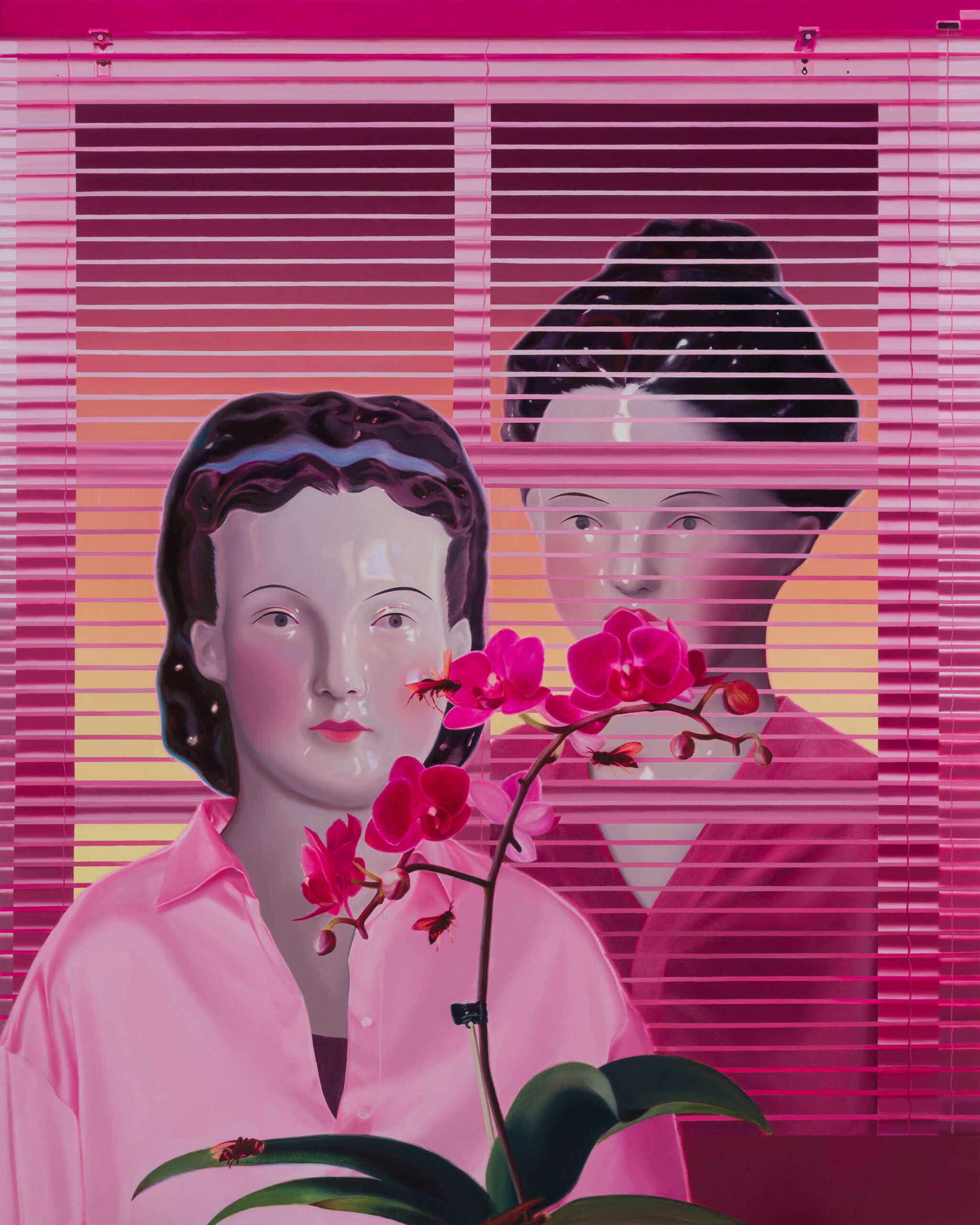 Jiwon Choi,
The Death of Wasps, 2022, Oil on canvas, 162.2x130.3cm ©ThisWeekendRoom
Jiwon Choi,
The Death of Wasps, 2022, Oil on canvas, 162.2x130.3cm ©ThisWeekendRoomSince 2022, new elements such as doors,
blinds, and curtains—barriers that delineate the inside from the outside—have
begun to appear in her paintings. Positioned between porcelain figurines or
between the figures and the viewer, these elements suggest both closure and
openness, embodying a liminal quality.
Situated within these ambiguous boundaries,
the porcelain figurines further reflect the unstable and complex emotions of
contemporary individuals, manifesting in a variety of situations.
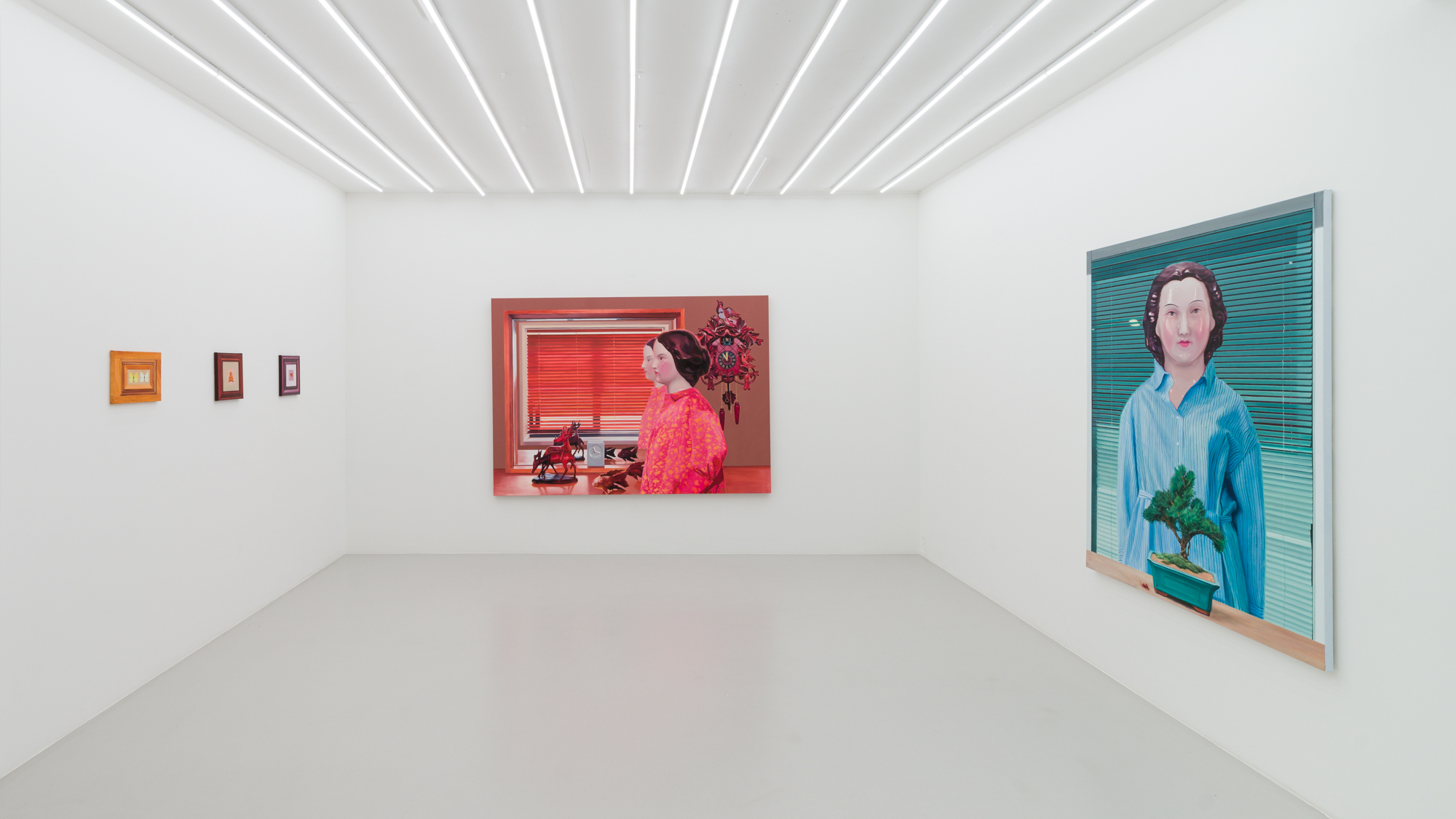 Installation view
of 《Collecting Chamber》 (ThisWeekendRoom, 2023)
©ThisWeekendRoom
Installation view
of 《Collecting Chamber》 (ThisWeekendRoom, 2023)
©ThisWeekendRoomRecently, Jiwon Choi’s work has shown a
gradual expansion beyond the porcelain figurines, extending into the
surrounding space. In her 2023 solo exhibition 《Collecting
Chamber》 at ThisWeekendRoom, she presented paintings
that constructed a "chamber" where porcelain dolls, objects
resembling living beings, or remnants of once-living creatures were
placed.
Observing the ornaments quietly resting in
her room—porcelain figurines, an old cuckoo clock shaped like a birdhouse, and
dried insects fallen on the windowsill—Choi experienced the fragility and
fleeting beauty of life. Focusing on the forms and existential meanings of
these objects, she moved her brush as if breathing life into them,
repositioning them within a self-defined, surreal space.
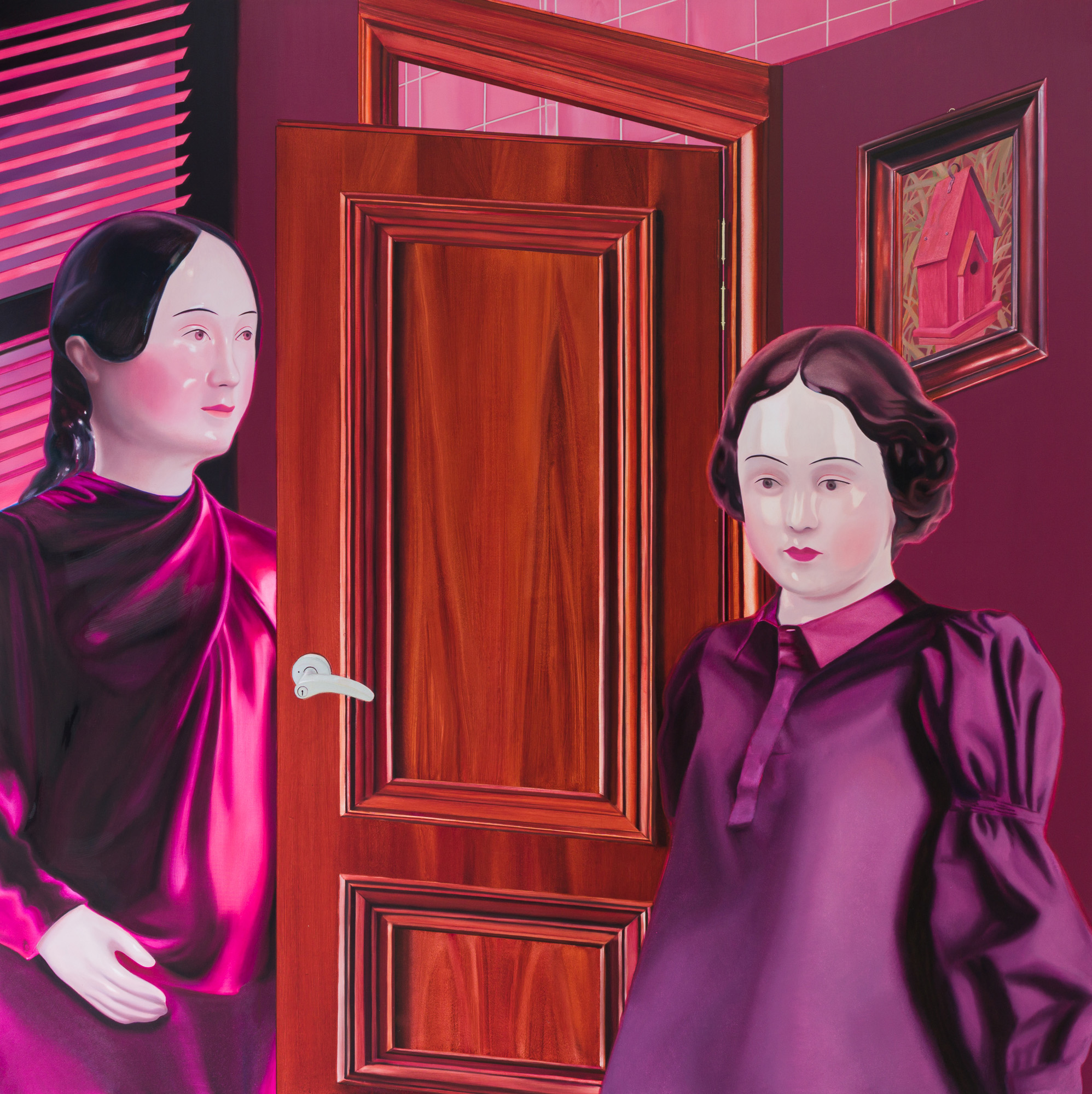 Jiwon Choi,
Into the Chamber of the Time, 2023, Oil on canvas, 181.8x181.8cm
©ThisWeekendRoom
Jiwon Choi,
Into the Chamber of the Time, 2023, Oil on canvas, 181.8x181.8cm
©ThisWeekendRoomObjects that have come to a standstill,
having exhausted their life force, occupy a space between life and death, past
and present, within Jiwon Choi’s paintings. The spaces in which these objects
are placed are composed of architectural elements with dual characteristics,
metaphorically revealing their existence.
For instance, Into the Chamber of
the Time (2023) divides the given space into sections, yet connects
them through doors that allow passage, while Blue Moon
(2023) draws the figurines inside through the structure of a glass window.
In this way, structures such as doors,
windows, frames, and blinds, which constitute the chamber, function as symbolic
portals that traverse the gap between life and death. As the viewers peer into
the chambers opened by the artist, they recall the moments where the boundary
between life and death collapses, experiencing both tension and liberation
within these spaces.
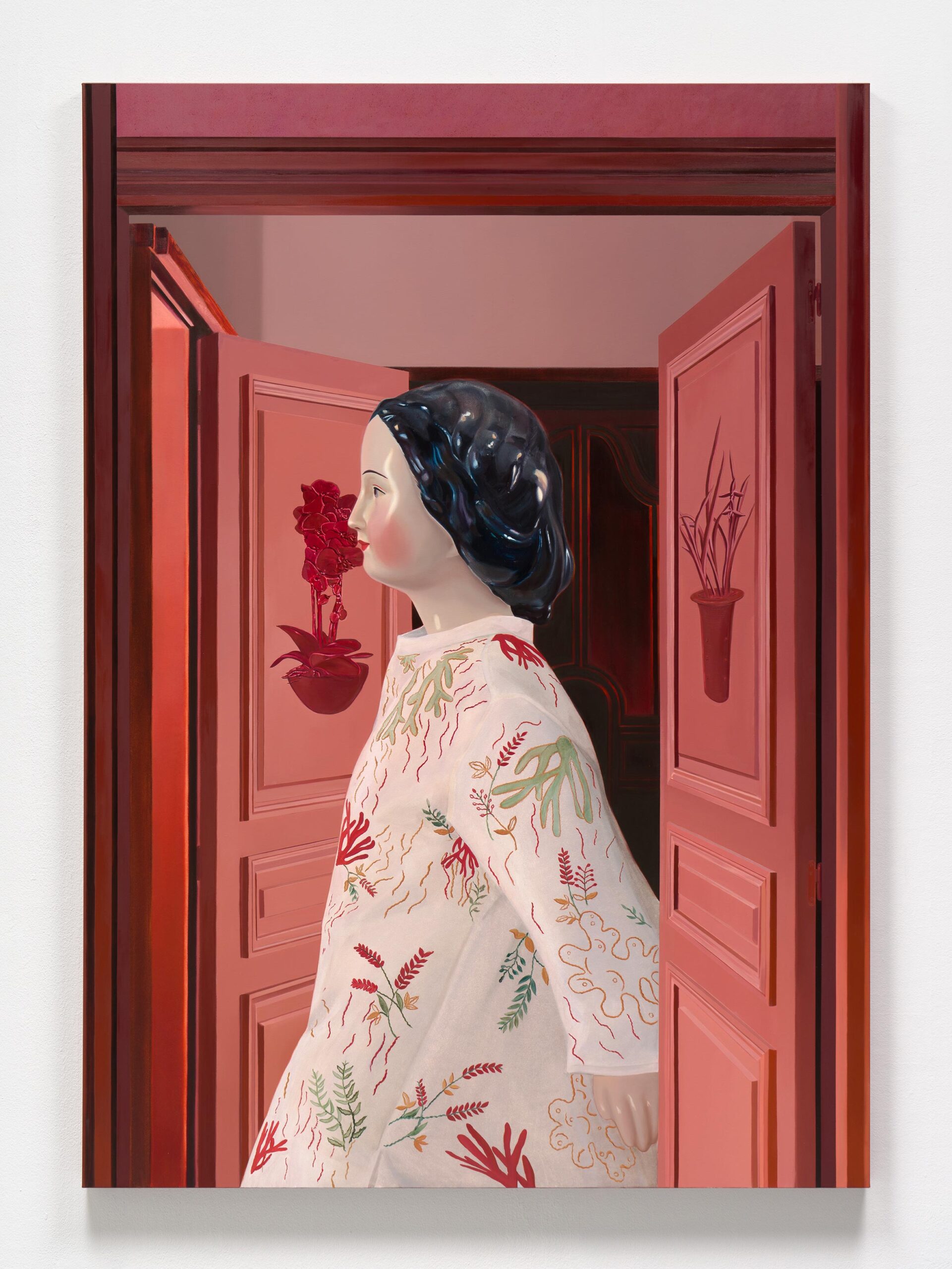 Jiwon Choi,
Path to the Past, 2024, Oil on canvas, 227.3 x162.1cm ©ThisWeekendRoom
Jiwon Choi,
Path to the Past, 2024, Oil on canvas, 227.3 x162.1cm ©ThisWeekendRoomIn this way, Jiwon Choi’s still life
paintings, as the artist herself states, are “works placed between life and
death.” She reflects on herself and her surroundings through objects that are
beautiful yet fleeting, solid yet fragile, and in her own way, breathes life
into them.
Her paintings, which intersect opposing
qualities such as life and death, beauty and transience, solidity and
fragility, subtly generate feelings of numbness, isolation, anxiety, and
tension that permeate the lives of contemporary individuals, conveying a sense
of empathy to the viewers.
“I want to convey the feeling of
conflicting and contradictory emotions, like things that are beautiful but
scary, close but distant, strong but fragile, all manifesting at once. I
believe that moments where dual elements coexist come together to create the
landscape of the present. I hope to depict emotions that everyone can relate to
in our time and, through that, provide a sense of empathy and comfort to many
people.” (Jiwon Choi, Urbanlike Interview, January 2022)
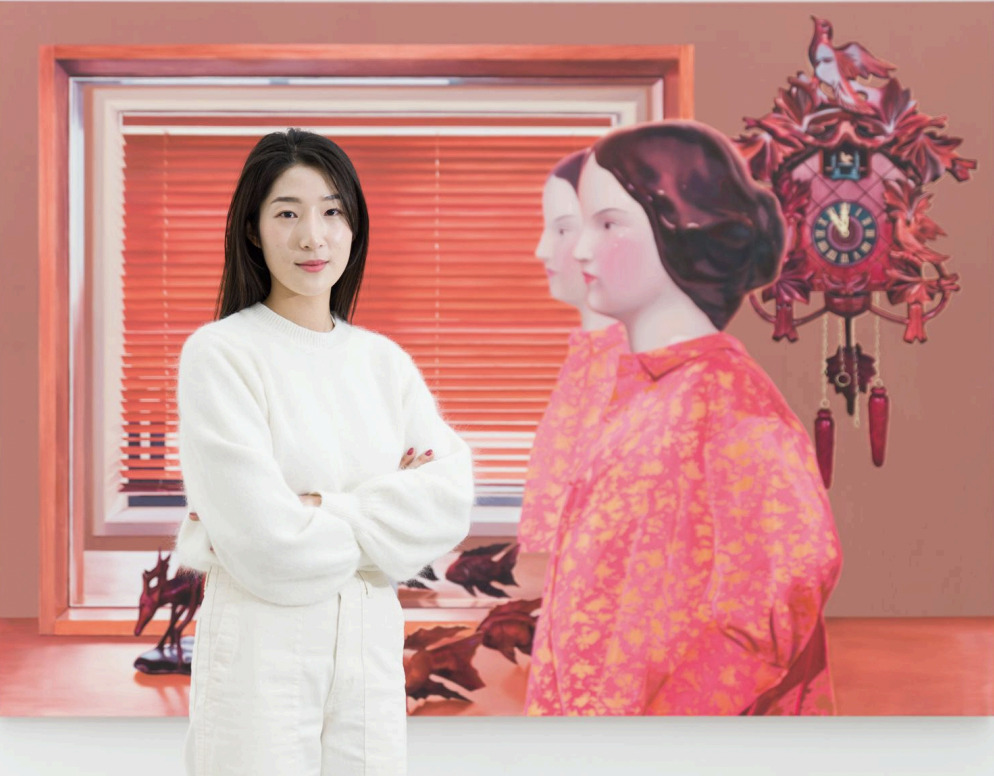 Artist Jiwon Choi ©ThisWeekendRoom
Artist Jiwon Choi ©ThisWeekendRoomJiwon Choi graduated from the Department of
Western Painting and the Graduate School of the same department at Ewha Womans
University. Her solo exhibitions include 《The Paused
Moment》 (PARKSEOBO FOUNDATION, Seoul, 2024), 《Collecting Chamber》 (ThisWeekendRoom, Seoul,
2023), and 《Cold Flame》
(ThisWeekendRoom, Seoul, 2020).
Recent group exhibitions she participated
in include 《Stemming from Umwelt》 (Tang Contemporary Art, Beijing, 2024), 《Inter-frame》 (Backstage, Shanghai, 2024), 《Memories
Beneath the Ego, Fantasy Above the Ego》 (Seoul National
University Museum of Art, Seoul, 2023), 《Future Solos 2》 (WESERHALLE, Berlin, 2023), 《The Most
Brilliant Moments For You》 (Gyeonggi Museum of Modern
Art, Ansan, 2022), 《Veil of Thought》 (Ilwoo Space, Seoul, 2022), and more.
Jiwon Choi was selected for the 2024 Kiaf
HIGHLIGHTS Awards and the 2022 Public Art New Heroe. Her works are part of
collections at the MMCA Art Bank, PARKSEOBO FOUNDATION, X Museum in China, and
White Rabbit Gallery in Australia.
References
- 디스위켄드룸, 최지원 (ThisWeekendRoom, Jiwon Choi)
- 디스위켄드룸, [서문] 차가운 불꽃 – 이가현 (ThisWeekendRoom, [Preface] Cold Flame – Gahyun Lee)
- 메종 마리끌레르 코리아, 인형의 꿈, 2024.05.17
- 현대리바트, [인터뷰] 청춘은 차갑다, 작가 최지원
- 키아프 서울, [ARTICLES] ARTIST INSIDE 2022 : 불안하고 위태로운 청춘의 초상
- 디스위켄드룸, [서문] 0인칭의 자리 – 박지형 (ThisWeekendRoom, [Preface] Is there any place for us? – Jihyung Park)
- 어반라이크, COLLECTOR’S FAVORITE, 2022년 1월호
























